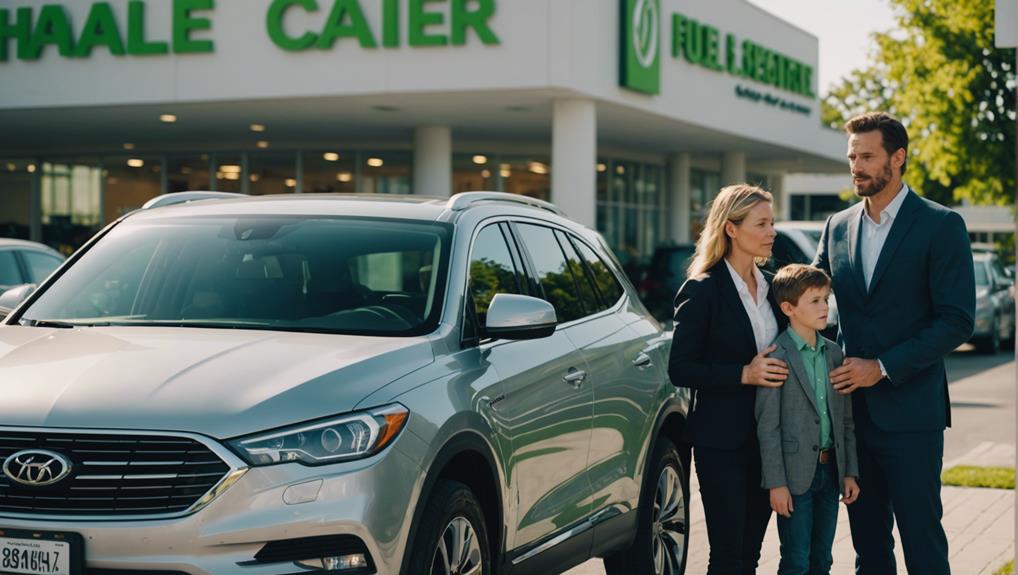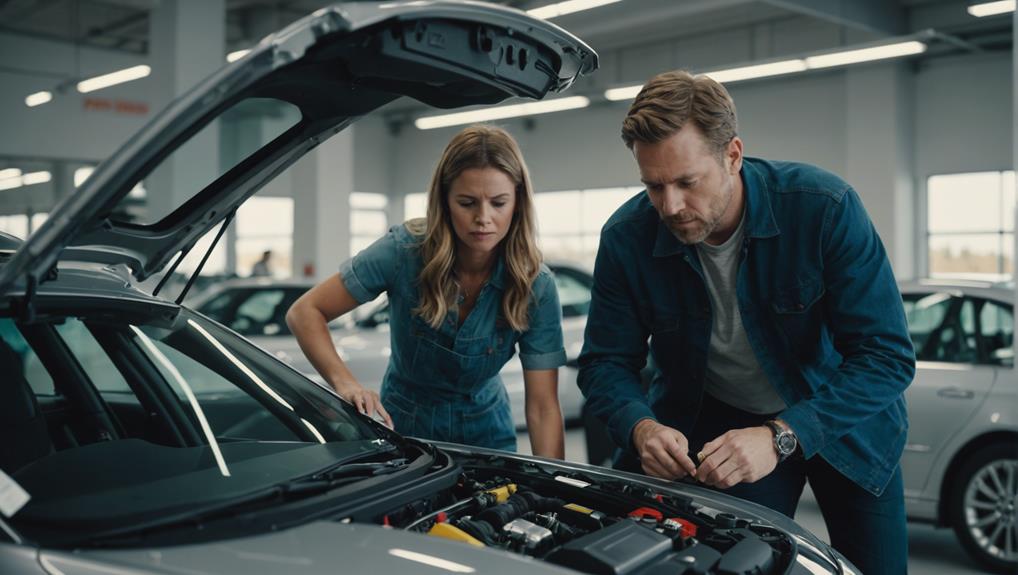When buying a family car, prioritize safety by checking NHTSA and IIHS ratings and ensuring features like ADAS and airbags. Look for spacious interiors with flexible seating and ample cargo space. Fuel efficiency is key, so compare MPG ratings and consider hybrids for city driving. Assess long-term costs by factoring in insurance, maintenance, and depreciation. Don't overlook technology—features like keyless entry and infotainment systems add convenience. Bring the whole family for test drives and evaluate comfort and tech. Secure financing with pre-approval and explore dealership offers. To make the best choice, you'll find more insights ahead.
Safety Ratings

When selecting a family car, prioritize vehicles with top safety ratings to ensure your loved ones are protected. Start by checking the ratings from reputable organizations like the National Highway Traffic Safety Administration (NHTSA) and the Insurance Institute for Highway Safety (IIHS). These entities rigorously test vehicles for crashworthiness and provide detailed safety scores.
Look for cars that have earned high marks in crash tests, including front, side, and rollover accidents. Pay attention to the car's structural integrity and how well it protects occupants in various scenarios. Safety features should be a top priority. Make sure the vehicle includes advanced driver assistance systems (ADAS) like automatic emergency braking, lane departure warnings, and adaptive cruise control.
Don't overlook the importance of airbags—side, curtain, and knee airbags can make a significant difference in an accident. Anti-lock brakes and electronic stability control are also critical. Verify that the car has child safety locks and LATCH systems for car seats, which enhance the safety of your younger passengers. By focusing on these safety aspects, you'll be better equipped to choose a family car that keeps everyone safe on the road.
Space and Comfort
Frequently, guaranteeing ample space and comfort in a family car is just as crucial as prioritizing safety. When you're planning family trips or even just daily commutes, everyone needs to feel relaxed and at ease. Cramped quarters can lead to cranky passengers and an overall unpleasant experience. Here's what you should look for:
- Ample Legroom and Headroom: Check both the front and back seats. Taller family members should have enough space to stretch out without feeling squished.
- Flexible Seating Arrangements: Look for vehicles with adjustable seats and options like split-folding rear seats. This flexibility can make a big difference when you need to transport larger items.
- Cargo Space: Don't underestimate the importance of a spacious trunk. Whether it's groceries, sports gear, or luggage for a vacation, ample cargo space is essential for a family car.
- Comfort Features: Modern conveniences like climate control, heated seats, and high-quality upholstery can greatly enhance your driving experience. These features ensure that everyone stays comfortable, regardless of the journey's length.
Fuel Efficiency

When considering fuel efficiency, you'll want to look at miles per gallon to understand how far a car can go on a tank of gas. Compare hybrid and gasoline options to see which suits your family's needs best. Remember, better fuel efficiency can lead to significant long-term savings.
Miles Per Gallon
Understanding a car's miles per gallon (MPG) is essential for estimating fuel costs and environmental impact. When choosing a family car, MPG should be high on your list of considerations. Not only does a higher MPG mean you'll spend less on gas, but it also reduces your carbon footprint, making it a win-win for your wallet and the planet.
To make an informed decision, keep the following points in mind:
- City vs. Highway MPG: Cars often have different MPG ratings for city and highway driving. If you do a lot of city driving with frequent stops, focus on the city MPG. Conversely, if you spend more time on highways, the highway MPG will be more relevant.
- Vehicle Size: Larger vehicles like SUVs and minivans generally have lower MPG compared to smaller cars. If fuel efficiency is a priority, consider a smaller vehicle that still meets your family's needs.
- Driving Habits: Aggressive driving and speeding can drastically reduce MPG. Opt for a car with good fuel efficiency to mitigate the impact of these habits.
- Maintenance: Regular vehicle maintenance, such as keeping tires properly inflated and changing the oil, can improve your car's MPG.
Hybrid Vs. Gasoline
If you're weighing fuel efficiency options, it's important to compare hybrid vehicles with traditional gasoline cars. Hybrids combine a gasoline engine with an electric motor, allowing them to switch between or combine power sources. This often results in much better fuel efficiency, especially in stop-and-go traffic where the electric motor can take over.
On the other hand, traditional gasoline cars rely solely on internal combustion engines. While advancements have made them more fuel-efficient over the years, they generally can't match the miles per gallon (MPG) that hybrids offer. For example, many hybrid models can achieve over 50 MPG, whereas most gasoline cars average between 25 to 35 MPG.
When considering a hybrid, you'll notice that their improved fuel efficiency translates into fewer trips to the gas station. This can be a huge advantage for busy families always on the go. Additionally, hybrids often perform better in urban environments where frequent stops and short trips are common.
However, if you frequently drive long distances on highways, the gap in fuel efficiency between hybrids and gasoline cars narrows. Traditional gasoline cars can be more straightforward regarding maintenance without the added complexity of an electric motor and battery system.
Long-Term Savings
One of the biggest advantages of fuel-efficient vehicles is the substantial long-term savings on fuel costs. When you opt for a car that uses less gas, you'll notice a significant difference in your monthly budget. These savings can add up quickly, making fuel efficiency a critical factor in your decision-making process.
Here are four key benefits of choosing a fuel-efficient vehicle:
- Lower Fuel Expenses: You'll spend less money at the pump, freeing up funds for other necessities or family activities.
- Reduced Environmental Impact: Fuel-efficient cars release fewer emissions, helping you contribute to a healthier planet for future generations.
- Higher Resale Value: As gas prices continue to fluctuate, fuel-efficient cars typically retain a higher resale value compared to their less efficient counterparts.
- Potential Tax Incentives: Depending on where you live, you might qualify for tax credits or rebates when you purchase a fuel-efficient or hybrid vehicle.
Reliability
When considering a family car, you should prioritize reliability to guarantee long-term durability. A reliable vehicle will not only save you money on maintenance costs but also keep your family safe. Let's explore how different models measure up in these critical areas.
Long-term Durability
Guaranteeing your family car has long-term durability means you'll spend less time and money on repairs and more time enjoying the ride. When you're evaluating a car's durability, focus on key factors that indicate a vehicle's ability to withstand the test of time. Here are some tips to make sure you choose a durable car:
- Check Reliability Ratings: Look up reliability ratings from trusted sources like Consumer Reports or J.D. Power. These ratings provide insights into how well a car holds up over the years.
- Research Manufacturer Reputation: Some car brands are known for their durability. Brands like Toyota, Honda, and Subaru often receive high marks for producing long-lasting vehicles.
- Review Owner Experiences: Online forums and customer reviews can offer firsthand accounts of a car's performance over time. Pay attention to common issues reported by multiple owners.
- Consider Guarantee Offers: A lengthy, all-encompassing guarantee can be a good indicator of a manufacturer's confidence in their vehicle's durability. It also provides peace of mind knowing that major issues will be covered.
Maintenance Costs
While long-term durability guarantees your family car will last, it's equally important to take into account the maintenance costs associated with keeping it reliable. Regular maintenance is inevitable, but some cars are more costly to maintain than others. You should consider not just the initial purchase price, but also the ongoing expenses that could add up over time.
Here's a quick comparison of maintenance costs for popular family car models:
| Car Model | Average Annual Maintenance Cost | Reliability Rating (out of 5) |
|---|---|---|
| Toyota Camry | $388 | 4.5 |
| Honda CR-V | $407 | 4.4 |
| Ford Explorer | $732 | 3.8 |
| BMW X5 | $1,166 | 3.5 |
You can see that while some vehicles might have a lower purchase price, they could end up costing more in the long run due to higher maintenance expenses. Prioritize models with lower average annual costs and higher reliability ratings to maximize value and peace of mind. Always check the manufacturer's maintenance schedule and read reviews to understand common issues. This will help you avoid unexpected expenses and keep your family car running smoothly for years to come.
Cost of Ownership

Understanding the cost of ownership is essential when purchasing a family car, as it encompasses more than just the purchase price. You need to take into account various ongoing expenses that can greatly impact your budget over time. Here are four critical factors to bear in mind:
- Insurance Costs: The type of car you choose can greatly influence your insurance premiums. Family cars with advanced safety features typically have lower insurance costs.
- Fuel Efficiency: A car with excellent fuel efficiency can save you a substantial amount of money in the long run. Look for vehicles with high miles-per-gallon (MPG) ratings, especially if you plan to use your car for daily commutes or long trips.
- Depreciation: Cars lose value over time, but some models depreciate faster than others. Research the depreciation rates of different makes and models to understand how much your car will be worth in a few years.
- Maintenance and Repairs: Regular maintenance is unavoidable, but some cars have higher upkeep costs. Check the reliability ratings and average repair costs for the models you're considering to avoid any unwelcome surprises.
Technology Features
When buying a family car, you should consider the technology features that can enhance safety, convenience, and entertainment. Advanced safety features like adaptive cruise control, lane-keeping assist, and automatic emergency braking can provide peace of mind on the road. These systems help prevent accidents and make driving less stressful, especially during long trips.
Convenience features are also essential for family cars. Look for keyless entry, push-button start, and a hands-free liftgate. These additions can make your day-to-day routine smoother, especially when you're juggling groceries, kids, and other items. Additionally, a user-friendly infotainment system with a touchscreen, Bluetooth connectivity, and multiple USB ports can keep everyone connected and entertained.
Don't forget about entertainment options. Rear-seat entertainment systems with screens and wireless headphones can be a lifesaver on long drives by keeping kids occupied. Many modern vehicles also offer smartphone integration through Apple CarPlay and Android Auto, allowing you to access your favorite apps, music, and navigation tools seamlessly.
Test Driving Tips

Taking a test drive is essential to make sure the car meets your family's needs and preferences. It's your chance to see how the vehicle performs in real-world conditions and to guarantee everyone's comfort. Here are some tips to make the most out of your test drive:
- Bring the Family: If possible, bring your partner and kids along. Their feedback is invaluable, and you can see how everyone fits comfortably.
- Check the Car Seats: If you have young children, bring their car seats. Make sure they fit properly and can be installed and removed with ease.
- Drive in Various Conditions: Don't just stick to the dealer's suggested route. Test the car on highways, in residential areas, and on rough roads to get a full picture of its performance.
- Test the Features: Try out the tech and comfort features, like the infotainment system, seat adjustments, and cargo space. Guarantee everything is intuitive and meets your daily needs.
Financing Options
After a successful test drive, it's important to explore the various financing options available to make your dream car a reality. Understanding your choices can help you secure the best deal. First, consider getting pre-approved for a loan from your bank or credit union. This gives you a clear picture of how much you can afford and often results in better interest rates compared to dealership financing.
Dealership financing can be convenient, but it's crucial to compare offers. Sometimes, dealerships have special promotions or partnerships with lenders that could offer competitive rates. Don't hesitate to negotiate; even a small reduction in interest rates can save you a significant amount over the loan term.
Leasing is another option if you prefer driving a new car every few years. Monthly payments are typically lower compared to buying, but remember, you won't own the car at the end of the lease term. Be mindful of mileage limits and potential fees for excess wear and tear.
Lastly, explore manufacturer financing incentives like cashback offers or low APR deals. These can provide substantial savings if you qualify. By carefully evaluating your financing options, you can make sure your new family car fits within your budget.
Resale Value

Understanding your car's resale value can save you money and inform your purchase decision. When shopping for a family car, you want to guarantee that your investment retains as much value as possible over time. Resale value affects how much you'll get back when it's time to sell or trade in your vehicle. Here are some key factors that can impact a car's resale value:
- Brand Reputation: Reliable brands often have higher resale values. Research which manufacturers consistently produce vehicles known for longevity and dependability.
- Mileage: Cars with lower mileage typically fetch higher prices. Aim for a vehicle that balances usage with maintenance.
- Condition: A well-maintained car will always sell for more. Regular servicing and addressing minor issues promptly can greatly boost your car's resale potential.
- Features and Upgrades: Modern safety features, fuel efficiency, and technology enhancements can make your car more appealing to future buyers.




